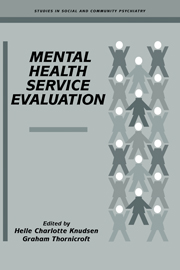Book contents
- Frontmatter
- Contents
- List of contributors
- Foreword
- Preface
- Part I INTRODUCTION
- Part II COMPREHENSIVE SERVICE EVALUATION PROJECTS
- Part III METHODS: MEASUREMENT, STRATEGIES AND NEW APPROACHES
- 8 Strategies of measurement and analyses
- 9 Experimental and quasi-experimental design in evaluative research
- 10 An informal introduction to graphical modelling
- 11 Meta-analysis
- Part IV SYSTEM-LEVEL RESEARCH
- Part V PROGRAMME-LEVEL RESEARCH
- Part VI HEALTH ECONOMICS IN MENTAL HEALTH
- Index
11 - Meta-analysis
from Part III - METHODS: MEASUREMENT, STRATEGIES AND NEW APPROACHES
Published online by Cambridge University Press: 05 August 2016
- Frontmatter
- Contents
- List of contributors
- Foreword
- Preface
- Part I INTRODUCTION
- Part II COMPREHENSIVE SERVICE EVALUATION PROJECTS
- Part III METHODS: MEASUREMENT, STRATEGIES AND NEW APPROACHES
- 8 Strategies of measurement and analyses
- 9 Experimental and quasi-experimental design in evaluative research
- 10 An informal introduction to graphical modelling
- 11 Meta-analysis
- Part IV SYSTEM-LEVEL RESEARCH
- Part V PROGRAMME-LEVEL RESEARCH
- Part VI HEALTH ECONOMICS IN MENTAL HEALTH
- Index
Summary
Introduction
Meta-analysis is the quantitative synthesis of the results of a systematic overview of previous studies. Systematic overviews are a method of collating and synthesising all the available evidence on a particular scientific question. For example, in making decisions about the most effective and efficient treatment for a condition, it is important to review all the previously generated evidence. On occasions it is appropriate to calculate some overall estimate of the effectiveness of the treatment. This can be done fairly simply by performing a stratified analysis of the available results, weighting the studies so that the larger, more statistically powerful studies are given more weight. However, the validity of such a quantitative approach will rest upon the method with which the studies have been selected and the completeness of the evidence collected in the systematic review.
It should be emphasised that the principles of the sytematic overview apply to many, perhaps all, areas of medical research. However, in the context of this book we shall concentrate almost exclusively on evaluations of the effectiveness of treatments, in particular using randomised controlled trials (RCTs). This is because the RCT is the most powerful research design available to assess the effects of health care, because of the random allocation of confounding variables between the groups to be compared (Altman, 1991).
Systematic reviews versus subjective reviews
The principle of systematic reviews is that the process of the review should be as scientific and systematic as the process of carrying out new research studies. Systematic reviews and meta-analyses are a scientific endeavour, and to accomplish them properly requires considerable effort and attention to detail. One can reasonably enlarge this argument and claim that the design of new studies and the interpretation of results can only be done sensibly in the context of a comprehensive and systematic review of the literature. It seems that the medical profession has been rather late in accepting this principle and reviewing literature is often seen as a secondary process, in many ways qualitatively different from generating the research evidence itself. Systematic reviews have a key place in efforts to draw conclusions from research and thus influence clinical practice.
- Type
- Chapter
- Information
- Mental Health Service Evaluation , pp. 176 - 194Publisher: Cambridge University PressPrint publication year: 1996

